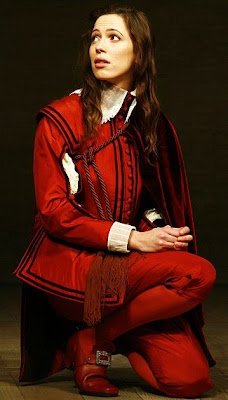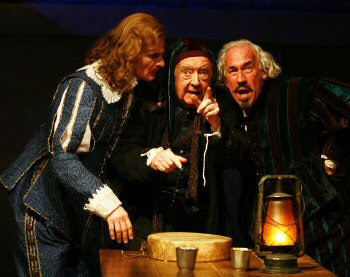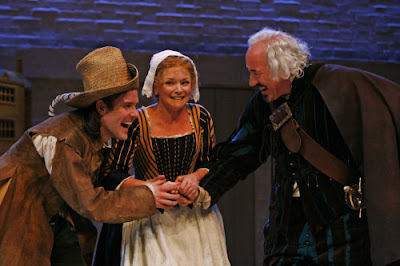The 50 shows that have stood out down the years and,
as we get up among the paint cards, the shows that have become the cast
recording of my life:
First performed: 1728, Lincolns Inn Fields Theatre, London
First seen by me: 1982, Cottesloe, National Theatre
Productions seen: two
Score: various
Book: John Gay
Plot: In the slums of East London, legendary highwayman Macheth's luck finally runs out as he is arrested and taken to Newgate. Facing the prospect of hanging, Macheath must rely on the help of his mistresses - but will they agree to help if they find out about each other?
Score: various
Book: John Gay
Plot: In the slums of East London, legendary highwayman Macheth's luck finally runs out as he is arrested and taken to Newgate. Facing the prospect of hanging, Macheath must rely on the help of his mistresses - but will they agree to help if they find out about each other?
Five memorable numbers: I LIKE THE FOX SHALL GRIEVE, LET US TAKE THE ROAD, IF THE HEART OF A MAN, I'M BUBBLED I'M TROUBLED, WHY HOW NOW MADAME FLIRT
THE BEGGAR'S OPERA has galloped down 291 years like it's anti-hero Macheath escaping the law. Along the way it has discarded the satirical contemporary references that would have accounted for it's huge success - many saw in the outwardly respectable but secretly double-dealing Peachum a veiled allusion to politician Robert Walpole - as well as referencing 'superstar' villains like Jonathan Wild, Claude Duval and Jack Sheppard but it has retained it's involving plot, larger-than-life characters and it's over-riding message that what is forgiven if you are rich is criminalized if you are poor. John Gay's original intention was to have the many songs and airs sung with no musical accompaniment but that was considered too avant-garde for the 18th Century - I am sure someone will come up with that idea now and be hailed as visionary. THE BEGGAR'S OPERA was such a success that Gay wrote a sequel POLLY featuring Macheath and Polly in the West Indies but the satire was too biting for Walpole and it was banned for fifty years. BEGGAR was of course the inspiration for Bertolt Brecht and Kurt Weill's THE THREEPENNY OPERA which utilized most of the characters and plotline but the original remains the more sprightly. It was thanks to Richard Eyre and his legendary 1982 National Theatre company that I first saw THE BEGGAR'S OPERA when it seemed a natural complement for their more optimistic GUYS AND DOLLS: Eyre gave it more of a Dickensian feel, the pervading gloom of John Gunter's rickety slum set and Peter Radmore's pea-souper lighting made it feel almost immersive. Giving definitive characterizations were Paul Jones as the cocksure Macheath, Belinda Sinclair as Polly, Harry Towb as a Northen Irish Peachum, June Watson as a bustling "Carry On"-style Mrs Peachum ("not wiv an 'ighwayman, you sorry slut"), Kevin Williams' scene-stealing servant Filch and Imelda Staunton's explosive Lucy Lockett.
Annoyingly, although the Richard Eyre production was filmed for Channel 4 in 1983, there isn't any sign of it on YouTube. Most of the videos are of either amateur productions or Peter Brook's lumpy film adaptation so here is a vocal clip of Jenna Russell as Lucy Lockett in the 1992 Royal Shakespeare Company production singing "Lucy's Lament".
























